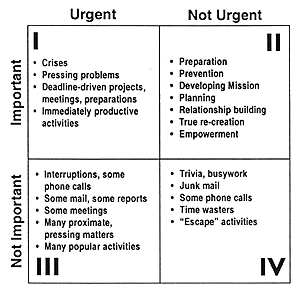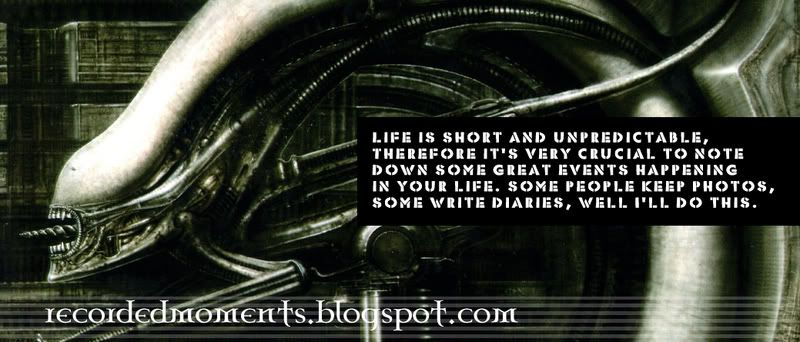
My facial expression was literally =.="

You think I'm funny?? Check HIM out!!

Got Banana at groin some more =.="
Habit 1 - I am the Programmer.
Habit 2 - Write the Program.
Habit 3 - Execute the Program.
Habit 3 is Personal Management, the exercise of independent will to create a life congruent with your values, goals and mission. The fourth human endowment, Independent Will, is the ability to make decisions and choices and act upon them. Integrity is our ability to make and keep commitments to ourselves. Management involves developing the specific application of the ideas. We should lead from the right brain (creatively) and manage from the left brain (analytically).
In order to subordinate your feelings, impulses and moods to your values, you must have a burning "YES!" inside, making it possible to say "No" to other things. The "Yes" is our purpose, passion, clear sense of direction and value.
Time management is an essential skill for personal management. The essence of time management is to organize and execute around priorities. Methods of time management have developed in these stages:
1) notes and checklists - recognizing multiple demands on our time
2) calendars and appointment books - scheduling events and activities
3) prioritizing, clarifying values - integrating our daily planning with goal setting (The downside of this approach is increasing efficiency can reduce the spontaneity and relationships of life.)
4) managing ourselves rather than managing time - focusing in preserving and enhancing relationships and accomplishing results, thus maintaining the P/PC balance (production versus building production capacity).
A matrix can be made of the characteristics of activities, classifying them as urgent or not urgent, important or not important. List the activities screaming for action as "Urgent." List the activities contributing to your mission, value or high-priority goals as "Important."

Quadrant I activities are urgent and important - called problems or crises. Focusing on Quadrant I results in it getting bigger and bigger until it dominates you.
Quadrant III activities are urgent and not important, and often misclassified as Quadrant I.
Quadrant IV is the escape Quadrant - activities that are not urgent and not important.
Effective people stay out of Quadrants III and IV because they aren't important. They shrink Quadrant I down to size by spending more time in Quadrant II.
Quadrant II activities are important, but not urgent. Working on this Quadrant is the heart of personal time management. These are PC activities.
Quadrant II activities are high impact - activities that when done regularly would make a tremendous difference in your life. (Including implementing the Seven Habits.)
Initially, the time for Quadrant II activities must come from Quadrants III and IV. Quadrant I can't be ignored, but should eventually shrink with attention to Quadrant II.
1) Prioritize
2) Organize Around Priorities
3) Discipline yourself
Self discipline isn't enough. Without a principle center and a personal mission statement we don't have the necessary foundation to sustain our efforts.
Covey has developed a Quadrant II organizer meeting six criteria:
Coherence - integrates roles, goals, and priorities.
Balance - keeps various roles before you so they're not neglected.
Quadrant II Focus - Weekly - the key is not to prioritize what's in your schedule, but to schedule your priorities.
A People Dimension - think of efficiency when dealing with things, but effectiveness when dealing with people. The first person to consider in terms of effectiveness is yourself. Schedules are subordinated to people.
Flexibility - the organizer is your servant, not your master
Portability
There are four key activities in Quadrant II organizing, focusing on what you want to accomplish for the next 7 days:
1) Identify Roles
2) Select Goals - two or three items to accomplish for each role for the next week, including some of your longer term goals and personal mission statement
3) Scheduling/Delegating - including the freedom and flexibility to handle unanticipated events and the ability to be spontaneous
4) Daily Adapting - each day respond to unanticipated events, relationships and experiences in a meaningful way.
Here are five advantages of this organizer:
1) It's principle-centered - it enables you to see your time in the context of what's important and what's effective.
2) It's conscience directed - it enables you to organize your life around your deepest values.
3) It defines your unique mission, including values and long-term goals.
4) It helps you balance your life by identifying roles.
5) It gives greater perspective through weekly organizing.
The practical thread is a primary focus on relationships and a secondary focus on time, because people are more important than things.
The second critical skill for personal management is delegation. Effectively delegating to others is perhaps the single most powerful high-leverage activity there is. Delegation enables you to devote your energies to high level activities in addition to enabling personal growth for individuals and organizations. Using delegation enables the manager to leverage the results of their efforts as compared to functioning as a "producer."
There are two types of delegation: Gofer Delegation and Supervision of Efforts (Stewardship).
Using Gofer Delegation requires dictating not only what to do, but how to do it. The supervisor then must function as a "boss," micromanaging the progress of the "subordinate." The supervisor thus loses a lot of the leveraging benefits of delegation because of the demands on his time for follow up. An adversarial relationship may also develop between the supervisor and subordinate.
More effective managers use Stewardship Delegation, which focuses on results instead of methods. People are able to choose the method to achieve the results. It takes more time up front, but has greater benefits.
Stewardship Delegation depends on trust, but it takes time and patience. The people may need training and development to acquire the competence to rise to the level of that trust.
Stewardship Delegation requires a clear, up-front mutual understanding of and commitment to expectations in five areas:
Desired Results - Have the person see it, describe it, make a quality statement of what the results will look like and by when they will be accomplished.
Guidelines - Identify the parameters within which the individual should operate, and what potential "failure paths" might be. Keep the responsibility for results with the person delegated to.
Resources - Identify the resources available to accomplish the required results.
Accountability - Set standards of performance to be used in evaluating the results and specific times when reporting and evaluation will take place.
Consequences - Specify what will happen as a result of the evaluation, including psychic or financial rewards and penalties.
Using Stewardship Delegation, we are developing a goose (to produce golden eggs) based on internal commitment. We must avoid Gofer Delegation to get the golden egg or we kill the goose - the worker reverts to the gofer's credo: "Just tell me what to do and I'll do it."
This approach is a new paradigm of delegation. The steward becomes his own boss governed by his own conscience, including the commitment to agreed-upon desired results. It also releases his creative energies toward doing whatever is necessary in harmony with correct principles to achieve those desired results.
Immature people can handle fewer results and need more guidelines and more accountability interviews. Mature people can handle more challenging desired results with fewer guidelines and accountability interviews.
So once you have mastered the first 3 habits, you have conquered the personal victory. You have come to a certain alignment in your ownself and hence the next would be going out to the world to gain a public victory.
Side note: I bet a lot of people will think this post is too long to read. Well it's either you get it all or don't get it at all right? :p












5 comments:
hehe , this is like revision for 7 Habits ... haha.
so when you going to post about your honey ? :P
wahahahaha when i'm done with this i suppose... :p
wahahahaha when i'm done with this i suppose... :p
What's with the side note? :P I am thinking of copying the whole post and paste into words and use "summary". Wukakaka, but the summary function in word is just crap :P
Anyway, I know how to get it all :) By getting the person who masters it and let the fella practise it and I benefit from it. Hmmmm.... not bad at all right? :P
*Looking at jp's comment with mata sepet*
Eileen: hahaha you have a good idea huh? in a way u got me ady so yea u can benefit from it~ *smirk smirk*
Post a Comment